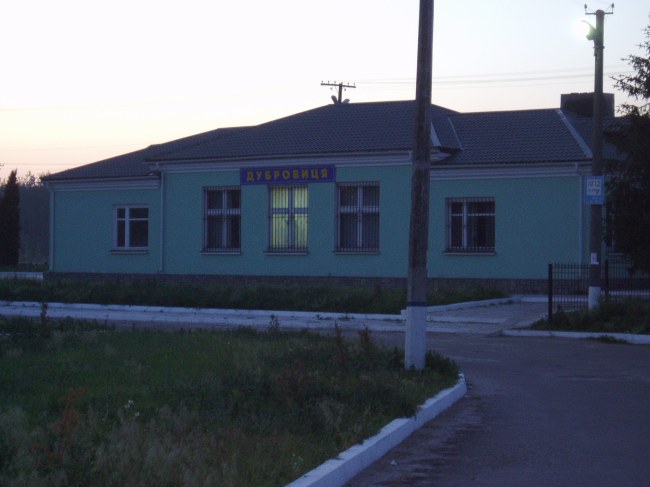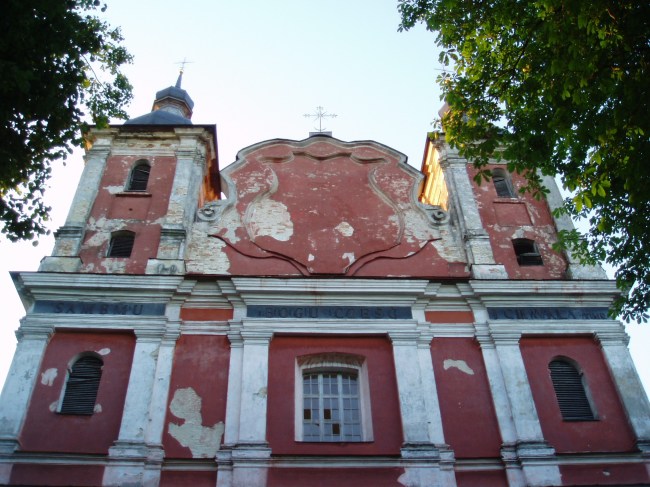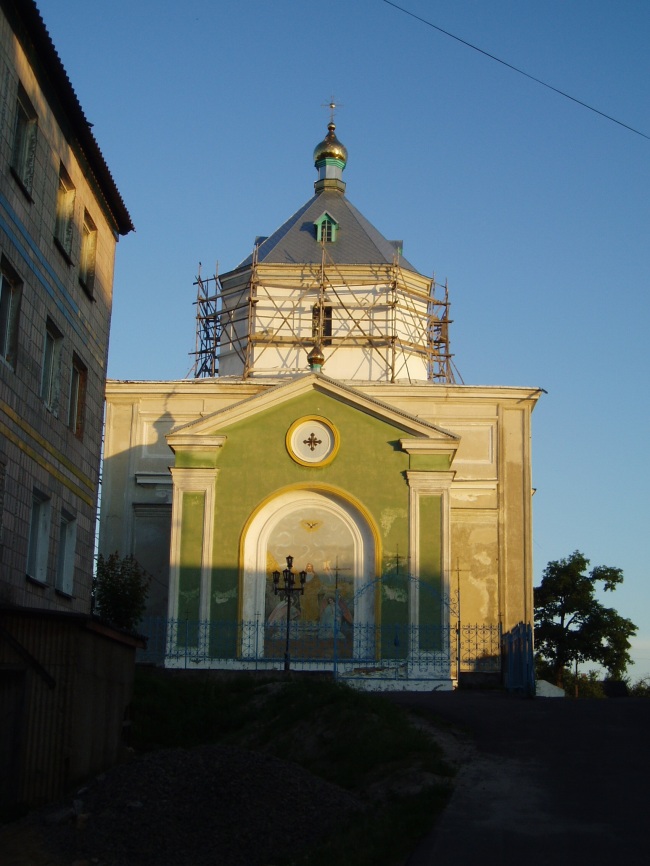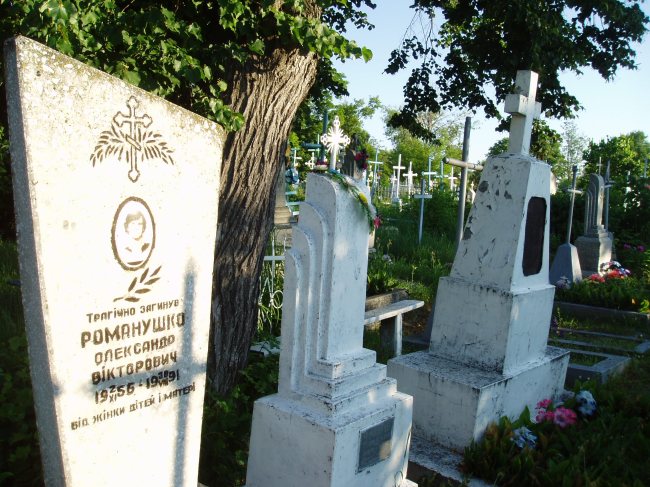This post, written from England, is more personal than most that have come previously but at the same time this outline of aspects of my family history should illustrate the historical complexities that have shaped the lives of people connected to the territories that now form western Ukraine.
My time in Ukraine was bookended by the death of a close family friend at the beginning and the birth of my sister-in-law’s first baby at the very end. The birth is easier to deal with here: four hours before my wife and I caught the train to Kyiv on Thursday 5 June, my wife’s sister gave birth to her first baby, a healthy boy named Vitaliy, at the maternity unit of an Ivano-Frankivsk hospital.
And now the story of the death which lead into a family history, a story which to some who read this will be all too familiar while for others it will be, perhaps, a quite extraordinary tale.
On 22 August 2012 I flew from London Luton to Kyiv to begin life in Ukraine after getting married in Ivano-Frankivsk in July that year. On that same day, 22 August, a man who grew up in Stanisławów (Stanislav[iv]), as Ivano-Frankivsk was known until its 300th anniversary in 1962, died in Leicester at the age of 90. This man was Kazimierz “Bob” Wojtyło who lived for the last few decades of his rich life in the Leicestershire village of Queniborough, where I was raised. The day before Bob’s death, I happened to come to his house with my mother to deliver some magazines. It was clear that he was in difficulty with his health, so an ambulance was called and I witnessed as he was taken out of his home for the last time. Just before I left for Luton airport, I learned of Bob’s death. So as the life of one man who was born in Stanisławów ended in Leicester, a young man (I was 28 in August 2012) raised in Leicester moved to Ivano-Frankivsk to start a new phase in his life.
This coincidence certainly had a conscious and unconscious influence on my time in western Ukraine, with this personal event making more aware than simply from a theoretical-academic perspective (I was in the midst of writing my PhD then, too) of the ghosts of the past that shape current behaviour, attitudes and interpretations.

Photo from ukrfoto.net of the centre of Ivano-Frankivsk with Kazimierz Wojtyło’s former home the building after the crossroads on the left. It’s now above a jeweller’s shop and links to a building of the Medical Academy. It also overlooks the Rally Square (Vichevyj Maidan) by the post office.
So how did Kazimierz Wojtyło, or Bob, end up in a rural Leicestershire village? And how did his fate connect to the fact that I was born and raised in the same place? Well, he left Stanisławów in the first years of the war during the Soviet invasion of 1939-1941 of the Polish eastern borderlands that were incorporated in 1939 into the Belarusian and Ukrainian SSRs. The details I present here are based on memories of conversations with him. After being involved in some kind of partisan group in his late teens, trying to escape towards Romania, he was deported to the depths of the USSR. With the amnesty that was granted to prisoners taken there in 1939-41, Kazimierz travelled like tens of thousands of other people towards Central Asia and the Middle East with the hope of joining the Anders Army, for those who were fit and young enough, or to find their way into British-controlled areas. Kazimierz ended up in Palestine at the end of the war and was then offered a choice of destinations by the British authorities.
While his brother chose Australia, Bob chose Britain where he worked for over a decade before moving to Australia. A well-paid spell in mining in Western Australia was cut short and he returned to the coalmines of Nottinghamshire. After a few years in that job he took on the Horse & Groom pub in Queniborough, the village where he is now buried alongside his first wife and survived by his second wife. This village pub attracted local drinkers, as well as some workers from Poland who were employed by this man, reported to be Pope John Paul II’s cousin (there’s a slight difference in the spelling of the surnames). Among these Polish workers was my mother, while among the drinkers was my father (who died in 2005).

Dąbrowica/ Дубровица train station, on the line from Lviv to St Petersburg via Belarus, taken on the day of the summer solstice in 2008. This is the home town of my grandmother. Dąbrowica/ Дубровица is now in Volhynia, NW Ukraine, while in the interwar period it was in Poland.
Now, why did my mother choose to come to Leicestershire where she first worked in the Horse & Groom, cooking and cleaning? This requires another long digression into family history, particularly that of my maternal grandmother and her relatives. My maternal grandmother was born in the early 1930s in the town of Dąbrowica (Дубровица) in the Volhynia region of what was then Poland and is now northwestern Ukraine. Her mother was of Ukrainian origin, while her father was the descendant of settlers who were awarded land and jobs in the eastern borderlands by the post-World War One Polish authorities as part of a Polonization programme. In 1939, my great grandfather – also Kazimierz – went off to fight for the Polish army and ended up in Siberia before finding his way to Scotland where he was part of the Polish air force serving alongside the RAF. He established a new family in Scotland and left behind three children who had ended up in Poland’s new postwar lands, the Recovered Territories acquired from Germany in 1945.
His wife, so my great grandmother, died on the journey from Dąbrowica/Дубровица to Germany, where she, her children and family members were taken in 1943 in a humanitarian exercise conducted by the Nazi authorities to protect Poles from ethnic violence conducted by Ukrainians in Volhynia against Poles, or – as was the case here – against people who were perceived as Polish. After marrying a Pole, my great grandmother and her family were marked out of the Ukrainian community. So in 1943, my grandmother, as a teenager, ended up in the Magdeburg region from where she moved after the war with her siblings and aunt to Poland’s new lands, settling just over the Neisse/Nysa River near Zgorzelec. In the early 1950s she the son of a family of voluntary settlers, who came to Poland’s new lands from the Tarnów area of southern Poland. My mother was born soon after and during the so-called “Carnival of Solidarity” period in early 1980s Poland, where certain travel restrictions were lifted, she managed to come to Britain initially with no intention of remaining, merely to earn enough money to buy a flat in Wrocław.
However, conditions in Poland changed with the situation turning towards Martial Law at the end of 1981, so she ended up staying and marrying one of the men from the pub. So, why Leicestershire? Down the road from Dąbrowica/Дубровица in what was known as a colony or kolonia, so a new settlement founded by Polish post-WWI settlers, lived my grandmother’s first cousin. She and her family were deported in 1940 by the Soviet authorities to the depths of the USSR. Settler families were among the chief groups subject to deportation, since they were seen as agents of Polish imperialism and kulak farming.
With the amnesty, my grandmother’s cousin along with many others travelled southwards and found themselves in Central Asia before being taken by the British to what was then the British-controlled Tanganyika Territory in East Africa. Here my grandmother’s cousin married a man who came from a family in a similar situation but had lived in the Belarusian-Lithuanian borderland before he and his settler forebears were deported to the depths of the USSR. They had a daughter in East Africa, with my grandmother’s cousin’s husband even learning Swahili. He says he would have stayed in East Africa but his daughter suffered from Malaria and so they opted to move to England, ending up in a displaced persons’ camp near Melton Mowbray in Leicestershire. My grandmother’s cousin’s husband’s brother, meanwhile, had opted to move to Australia, instead. Later, in the twenty first century, my grandmother’s cousin’s daughter’s son, born in Leicester, moved to Australia and ended up settling, completely by chance, in the same small village on the NSW coast where my English father’s sister and her family moved in the 1980s. Another one of those strange coincidences in family history.
Still, my grandmother’s cousin never moved from Leicestershire. My grandmother came to visit in the UK in the 1970s, visiting her cousin in Leicestershire while also having contact with her father who had settled in Scotland. My grandmother’s cousin and her family also visited Poland on several occasions in the 1970s, travelling by car to visit relatives scattered around the reshaped postwar country. This contact with the family in Leicestershire is why my mother was able to stay with them and eventually settle in the East Midlands where she remains to this day.
I was raised in a bi-lingual household, attending Polish Saturday school, acquiring a GCSE and A-Level in Polish, before studying it with German in London from 2002. I finally got around to acquiring Polish citizenship earlier this year. I visited my family in Poland basically every year of my life from the age of 9 months, then lived in Poland as an Erasmus student in 2004 before meeting the woman who would become my wife on a summer school for foreigners studying Polish held in Lublin. Only a few years after my wife, from Ivano-Frankivsk, first visited the UK did we visit Kazimierz Wojtylo, or Bob, together. While on previous visits I’d learned that he was somewhere “from the East”, he was never really given a chance to present his history as usually it was assumed on his behalf that “the young ones” won’t be interested in his story but we were simply being polite by listening.
However, once he learned that my wife was from Stanisławów/Ivano-Frankivsk, his memories flowed and he felt like he’d finally found an audience who would listen and understood where he had come from, both in the geographical sense and in the historical sense. And Bob, too, was fascinated to learn what had happened to his home town and, like us, was genuinely baffled that somehow history had conspired to bring, in the last years of his life, living contact with his home town. He has kept some memoirs, so hopefully one day it will be possible to read those. My wife and I managed to make a short film for him, which I hope he could see something of, as his failing eyesight tried to take in the images of today’s Ivano-Frankivsk, including his city-centre flat, that we had put together just a few weeks before he passed away.
Meanwhile, in summer 2006, my wife and I visited Dąbrowica/Дубровица after I had earlier that year listened to my grandmother, her sister and their cousin describe the town. So we tried to see as much of the town and as many of the places that were significant for them in their childhoods. Unfortunately, my grandmother died in August 2006 while my wife was on her first visit to the UK so we never had the chance, beyond a description over the phone of what we saw in Dąbrowica/Дубровица, to show her how her home town had changed. She remembered it, of course, although the memories attached to it that remained most strong were traumatic, histories of the war and Polish-Ukrainian ethnic violence, as well as Soviet deportations of family members.
Aside from shaping what I studied as an undergraduate, my family history also shaped my doctoral thesis. But it seems that my family’s story based around forced migration and deportation is a reflection of what, since 1989, and also in opposition memory under communism, has formed the dominant narrative in public memory, as well as in academic studies of population transfers. In a sense, my maternal grandfather’s story, the son of voluntary migrants, coming to former German lands seeking a better life or to make a quick fortune, was the basis of my thesis, so looking at the forgotten stories and experiences from the past that form today’s social realities, today’s communities.
What this blog post will have given readers, I don’t know. Perhaps an interesting story. Perhaps an indication of the complexities of identity constructions, even for the second and third postwar generation, of people whose family histories are connected to the contested Polish/Ukrainian/Belarusian/Lithuanian/Jewish/Soviet/German borderlands. My grandmother’s cousin, for example, just last week – now into her 90s – praised living in Britain in a manner more heartfelt than I’ve heard from anyone, praising the welfare state and NHS sincerely. But she still cries, like her husband, when the memories of wartime Poland and Siberia, or postwar East Africa, emerge. The scars aren’t healed. My mother maintains links to her Polish heritage, but she can’t ever see herself living in Poland again.
I now have dual nationality, but see myself as a Polish-English mix. Not British, because I lived in Scotland for about five years, and came to realise my Otherness there and the relative failure to construct a sense of Britishness that both I and the Scots I knew could identify with. My wife is purely Ukrainian, but has strong connections through her work and studies to Poland, and Polish is the language we speak mostly with each other. So what our kids will come to speak and, even more complexly, come to identify with is anyone’s guess.
Transnationality and cultural hybridity are trendy terms in cultural studies now, but this is a reality that ordinary people in provincial Poland, provincial Ukraine or provincial England, as well as Australian settlements, have been living out for decades.
And perhaps, to finish, another thing that perhaps this post will give readers is a reminder of life and death in the everyday, a peculiar jolt like the one I had when I realised how my experience in Ukraine – a land now living up again to the ‘Bloodlands’ sobriquet given to it by historian Timothy Snyder and by history, as tragedies of conflict play out again in ordinary people’s lives – was bookended by a family birth and the death of man born in Stanisławów.



